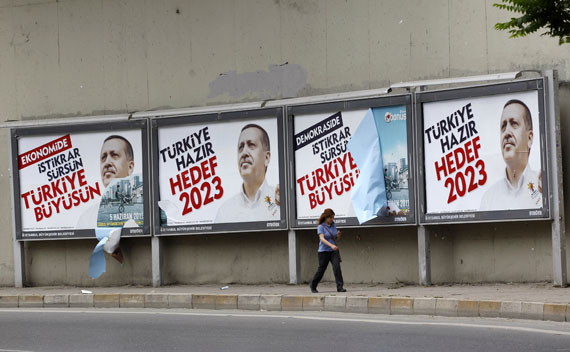What’s At Stake in Turkey’s Election
More on:

Below is my view on what is at stake in Turkey as it nears the June 12 elections. It was originally published on cfr.org.
Turks are in the final stage of a national election campaign, and the outcome on Sunday June 12 does not seem in doubt. Polls over the last six months show that for all the enthusiasm over the new leader of the opposition Republican People’s Party, Kemal Kilicdaroglu, Prime Minister Recep Tayyip Erdogan’s Justice and Development Party (AKP) remains overwhelmingly popular.
If AKP prevails as expected and wins another majority in the Grand National Assembly, Justice and Development will have dominated Turkish politics longer than any other party since the multi-party era began in 1946. This is a stunning irony for a party with Islamist patrimony in an officially laik--generally translated as secular--system, but AKP’s success is indicative of how much Turkey has changed over the course of the party’s tenure in power. Turkey is now an economic powerhouse, an influential player on the global stage, and importantly, transitioning from semi-authoritarian politics to a new political order. Precisely what Turkey’s political trajectory looks like depends on how Erdogan and his advisors use their renewed mandate.
Across Turkey’s political spectrum there is general agreement that the country needs a new constitution. The present document, written at the behest of the military junta in 1982, restricts important political and personal freedoms, compromising the quality of Turkey’s democratic practices and procedures. Despite important constitutional reforms that AKP oversaw in 2003 and 2004--which included limiting the military’s ability to influence politics, giving relatively greater cultural leeway for the Kurdish minority, making it more difficult to shutter political parties, and paving the way for changes to the penal code--Turkish society has outgrown the current constitution.
Indeed, Turkey is far more complex, socially varied, economically successful, and connected to the world than it was when the military stepped in to restore order in September 1980 after almost a decade of right-left violence and instability. Thirty years to date after that coup, the desire for change was clear in the September 2010 referendum over amendments to twenty-six articles of the constitution that passed with 58 percent of the vote, despite concerns among both Turkish and Western observers that the AKP could use some of the proposed changes for such anti-democratic ends, as court packing.
There was an aborted effort to write a new constitution in the fall of 2007, after AKP’s last electoral victory in which the party scored 47 percent of the vote. That effort ran into both technical problems--AKP did not have the supermajority in the Grand National Assembly (367 seats) needed to rewrite the constitution without requiring a referendum--and opposition to the party’s desire to enshrine in the constitution the freedom for women to don the headscarf wherever they pleased, a central issue in Turkey’s long-running culture war between secularists and Islamists.
Erdogan is banking on a different outcome this election cycle, which would give the party the supermajority it needs to proceed without having to bring a new constitution to the public. This is the crux of the opposition’s concern about a new constitution. Will the AKP approach the issue with the pragmatism it demonstrated in 2003-2007, when it pushed through seven constitutional reform packages, managed relations with the General Staff well, and led a broad coalition of liberals, pious Muslims, Kurds, and big business? Or will Erdogan infer from his mandate that he can preside over the constitutional drafting process with the same kind of thinly veiled disdain with which he has approached his political opponents, certain elements of the press, and some business leaders since 2007?
Although the party remains popular, many Turks would welcome a return to AKP’s first-term style, giving them confidence that Erdogan and his advisors can be stewards of a process that will ultimately result in a liberal democratic Turkey. Unfortunately, large numbers of Turks seem wary of Erdogan’s ability to lead a process that is likely to be highly contentious, requiring the kind of compromise and consensus---that have been in short supply over the last four years.
The United States supports the changes that AKP has brought to Turkey over the last nine years and would look positively on the consolidation of Turkish democracy under a new, liberal constitution. With a dismally low public approval rating among the vast majority of Turks (only 10 percent viewed the United States favorably in a recent poll), publicly encouraging Turkey’s transition to a more democratic political system is not likely to be received well in Ankara. Still, President Obama can capitalize on the reportedly good working relationship he has established with Prime Minister Erdogan to quietly encourage AKP to pursue a new constitution in a manner that is inclusive, transparent, and addresses the concerns of all Turks.
Should Erdogan and the AKP heed this advice, they will seal what they have long claimed to be their ultimate goal--forging a liberal political order in which personal and political freedoms are fully realized. If they do not, AKP will go down as a party that oversaw an extraordinary economic expansion and a novel foreign policy, but on domestic political issues was ultimately more populist than transformative, leaving Turkey short of its goal of becoming a fully democratic polity.
More on:
 Online Store
Online Store
